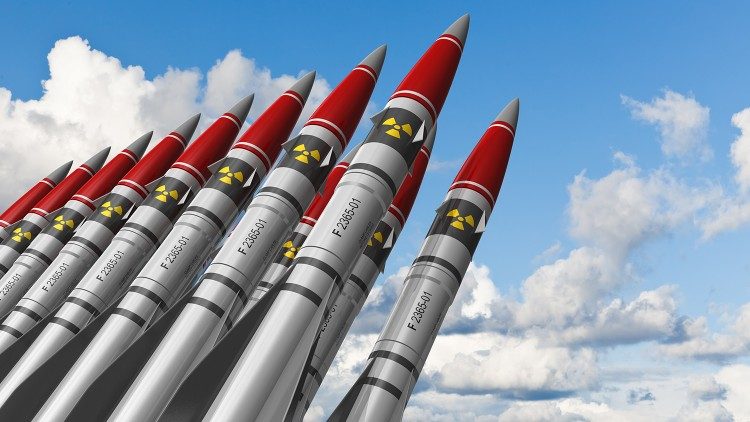 |
By Fr. Benedict Mayaki, SJ The Holy See has reiterated calls for complete nuclear disarmament, or the limitation of armaments, under effective systems of control and verification, in the face of the principal threats to peace and security in the world today. Archbishop Paul Richard Gallagher, the Vatican’s Secretary for Relations with States, made this call on Wednesday in a video message addressed to the High-Level Segment of the 2021 Session of the Conference on Disarmament taking place in Geneva, Switzerland. “Confronted with the many security challenges the international community is facing today,” he said, “it is essential that this Conference recognize that certain issues should transcend narrow individual interests by virtue of their contribution to the common good.” The Archbishop also conveyed the Pope’s cordial greeting to the participants, and expressed the Holy Father’s hope that impasses would be overcome through “a renewed sentiment of urgency and co-responsibility.” Peace, security threatened by arms proliferation The Vatican official pointed out that “the desire for peace, security and stability is one of the deepest longings of the human heart, even though these noble aspirations are impeded by the erosion of multilateralism and the present climate of reciprocal distrust, notably in the field of disarmament." He noted that while the importance of disarmament is evident for nuclear, biological and chemical weapons, it also applies to increased military competition in outer space, and in the fields of cyberspace and artificial intelligence, as seen in the example of lethal autonomous weapons systems. Another point of concern for the Holy See is the illicit traffic of small arms, light weapons and explosive weapons. These weapons, he explained, have been used to wreak havoc on schools, hospitals and places of worship, causing damage to basic infrastructure for the civilian population and affecting integral human development prospects. At the same time, the Archbishop continued, huge military expenditures foment a vicious cycle of an endless arms race, preventing potential resources from addressing poverty, education, inequality and health. In this regard, he decried the link of national security to the accumulation of weapons, referring it as a “false logic” and a scandal which facilitates the “disproportion between the resources in money and intelligence devoted to the service of death and the resources devoted to the service of life.” Signs of hope In spite of the current situation, the Vatican official noted that there are some encouraging signs including the Treaty on the Prohibition of Nuclear Weapons (TPNW) and the recent five-year extension of the New Strategic Arms Reduction Treaty (New START) between the US and Russia. Archbishop Gallagher also remarked that the Holy See is looking forward to the forthcoming Review Conference of the States Parties to the Treaty on the Non-Proliferation of Nuclear Weapons, in hopes that it “will result in concrete action in accordance with our joint intention to achieve at the earliest possible date the cessation of the nuclear arms race and to undertake effective measures in the direction of nuclear disarmament.” Affirming that a world free of nuclear weapons is both “possible and necessary”, he said this conviction, reinforced by the entry into force of the TPNW, is also embodied in the spirit of the Treaty on Non-Proliferation (NPT). At the same time, he pointed out that the TPNW and NPT are “driven by the very same moral imperatives and objectives” as they “mutually reinforce and complement each other, demonstrating how zealous the desire for peace, security and stability truly is.” Concrete suggestions In light of the importance of the complexity of disarmament and arms control, the Holy See made two recommendations to the member States at the conference: First, the Holy See encourages the member States to “engage in an expert study on the issue of verification, which could inform possible future negotiations on disarmament and arms control.” Archbishop Gallagher explained that verification, in addition to being a valuable confidence-building measure, is a “fundamental component in ensuring the efficacy of treaties under the well-known adage ‘trust and identify’.” He, therefore, urged the use of opportunities offered by new technologies to enhance reliable verification measures especially as it is of particular importance with regard to nuclear disarmament as well as other types of weapons. The Holy See also suggests that the resumption of “a formal discussion on limitations of armaments and on general and complete disarmament under effective systems of control and verification, would be extremely beneficial” to the conference, especially in the light of principal threats to peace and security including terrorism, asymmetrical conflicts, cybersecurity poverty and environmental problems. An ethical imperative Highlighting the need for a “more cohesive and responsible cooperation,” Archbishop Gallagher reiterated Pope Francis’ constant reminder that we can only overcome the current crisis if we work together, because “no one is safe until everyone is safe.” Concluding his message, the Archbishop stressed that disarmament can no longer be considered an optional objective, but rather an “ethical imperative.” He thus called for a renewed sense of urgency in the commitment to achieve durable agreements towards peace and fraternity, insisting that certain issues should rise above consensus and transcend individual interest and agendas. |
Views:5337

 Language
Language 

